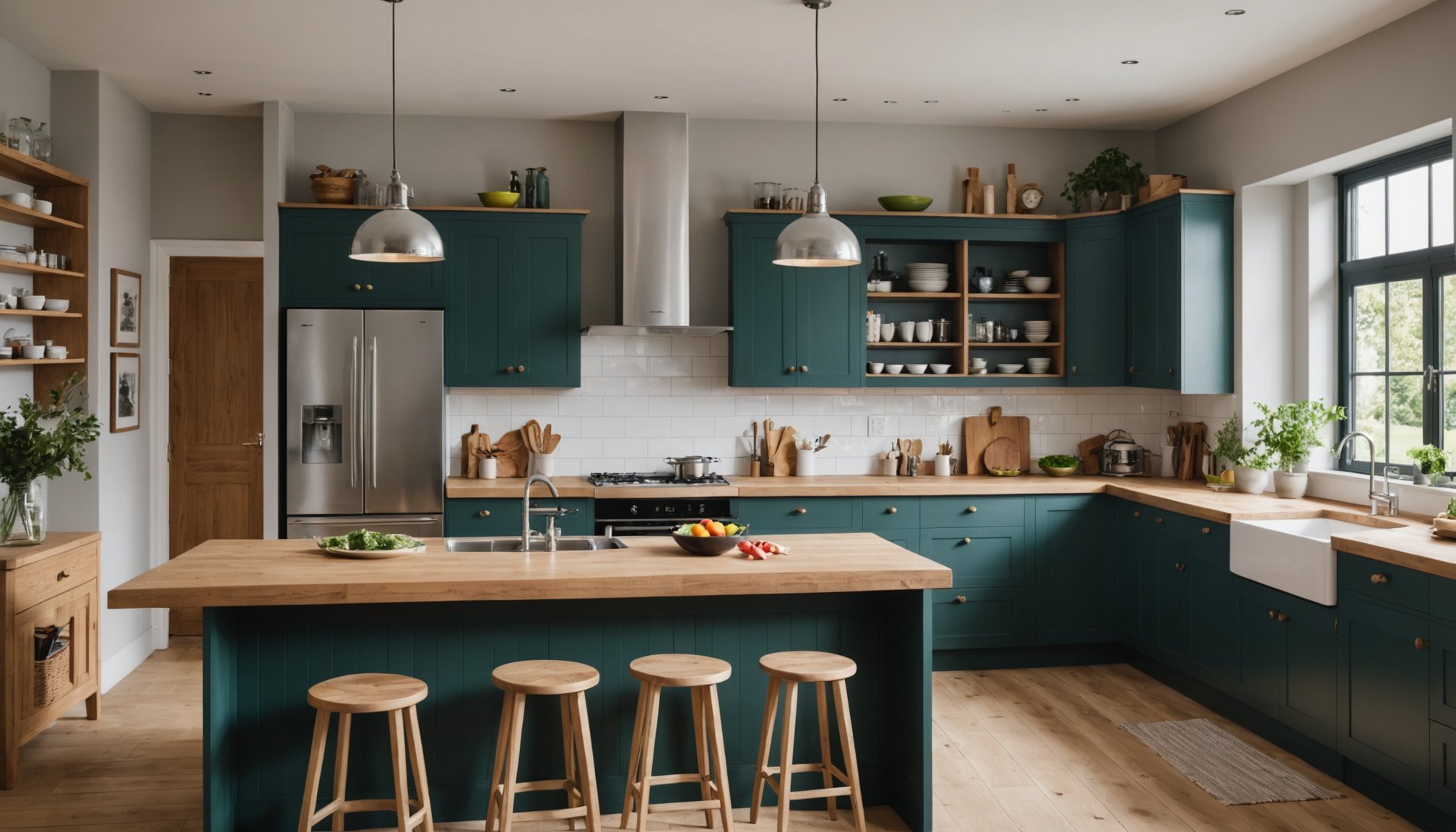Renovating your kitchen sustainably doesn’t just benefit the planet; it enhances your home’s aesthetic and value. This guide offers practical eco-friendly tips and innovative ideas tailored for UK homeowners. Discover how to choose materials wisely, reduce waste, and create a space that reflects your values while remaining stylish. Make your kitchen a hub of sustainability, proving that green living can be both functional and beautiful.
Understanding Sustainable Kitchen Renovation
Sustainable kitchen renovation is a growing trend among UK homeowners seeking to reduce their environmental impact. At its core, it involves integrating eco-friendly practices into the renovation process, focusing on energy efficiency, resource conservation, and sustainable materials. This approach not only benefits the environment but also enhances the functionality and aesthetic appeal of the kitchen.
En parallèle : Maximizing Energy Efficiency: The Ultimate Guide to Smart Thermostats for UK Households
Incorporating eco-friendly practices in kitchen design can offer numerous advantages. For instance, using energy-efficient appliances and LED lighting reduces energy consumption, leading to lower utility bills. Additionally, opting for materials like recycled glass or bamboo for countertops and cabinetry helps conserve natural resources and minimises waste. These practices contribute to a healthier indoor environment by reducing exposure to harmful chemicals often found in conventional building materials.
In the UK, sustainability trends are shaping how homeowners approach kitchen renovations. There is a noticeable shift towards using locally sourced materials to support the local economy and reduce carbon footprints. Moreover, water-saving fixtures and appliances are becoming standard, reflecting a broader commitment to preserving water resources. By embracing these trends, UK homeowners can create kitchens that are both stylish and environmentally responsible.
A lire en complément : Can smart window blinds help reduce heating costs in the UK winter?
Eco-Friendly Materials for Kitchen Renovation
Incorporating sustainable materials into your kitchen renovation is a key step towards an eco-friendly home. Various materials, such as bamboo, reclaimed wood, and recycled metal, offer both environmental benefits and aesthetic appeal. Bamboo is a rapidly renewable resource, making it an excellent choice for cabinetry and flooring. Reclaimed wood not only adds character but also reduces the demand for new lumber, while recycled metal can be used for countertops and backsplashes, providing durability and a modern look.
When selecting eco-friendly kitchen materials, it's essential to look for certifications that guarantee their sustainability. Certifications like FSC (Forest Stewardship Council) for wood products ensure that the materials are sourced responsibly, while Cradle to Cradle certification indicates that a product is designed with a sustainable lifecycle in mind.
For UK homeowners, there are several recommended suppliers who specialise in sustainable kitchen materials. Companies like The Reclaimed Flooring Company and Eco-Friendly Flooring provide a range of options for those looking to make environmentally conscious choices. By choosing these materials and suppliers, you not only support sustainable practices but also create a kitchen that is both stylish and environmentally responsible.
Energy-Efficient Appliances
Choosing energy-efficient appliances is crucial for a sustainable kitchen renovation. These appliances not only reduce electricity consumption but also lower utility bills, making them a smart investment for any homeowner. In the UK, understanding the energy ratings is essential when selecting appliances. The ratings range from A+++ to D, with A+++ being the most efficient.
Energy-efficient appliances include refrigerators, dishwashers, and ovens. For instance, a refrigerator with an A+++ rating can use up to 60% less energy than a D-rated model. Dishwashers with eco-friendly settings use less water and energy per cycle, contributing to resource conservation.
When shopping for eco-friendly appliances, look for the Energy Saving Trust label, which indicates products that meet high energy efficiency standards. Some top recommendations for energy-efficient kitchen appliances in the UK include brands like Bosch, Samsung, and Miele, known for their commitment to sustainability.
By integrating these appliances into your kitchen, you not only promote energy conservation but also enhance the overall functionality and modernity of your home. This approach aligns with the growing trend of sustainable living, benefiting both the environment and your household budget.
Waste Reduction Strategies
Incorporating waste reduction strategies is essential for a sustainable kitchen renovation. One effective method is implementing kitchen waste reduction techniques, such as careful planning to avoid over-ordering materials and repurposing existing elements. For example, instead of discarding old cabinetry, consider refurbishing or donating them to reduce waste.
Recycling in the kitchen can significantly decrease landfill contributions. Many old kitchen materials like metal fixtures, tiles, and wood can be recycled. Check with local recycling centres for guidelines on how to properly dispose of these items. This not only supports environmental sustainability but also promotes a circular economy.
Composting is a practical solution for managing organic kitchen waste. By setting up a composting system, you can convert food scraps into nutrient-rich soil, perfect for home gardening. This practice not only minimizes waste but also enriches the soil, promoting a healthier garden ecosystem.
By adopting these sustainable kitchen practices, homeowners can significantly reduce their environmental footprint. Emphasizing waste reduction, recycling, and composting ensures that your kitchen renovation is not only stylish and functional but also environmentally responsible.
Design Inspiration for Sustainable Kitchens
Exploring sustainable kitchen design can transform your space into an eco-friendly haven. Popular design styles like Scandinavian and minimalism are renowned for their sustainability focus. These styles emphasize clean lines, natural light, and minimal waste, embodying eco-friendly kitchen ideas.
To create a functional and eco-friendly kitchen layout, consider the kitchen's workflow. Position appliances and workspaces efficiently to reduce energy use. Incorporate natural materials like stone or reclaimed wood to enhance sustainability. Opt for open shelving to minimize material usage and allow for easy access to everyday items.
In the UK, several case studies highlight successful sustainable kitchen renovations. One notable example is a London-based project where designers used locally sourced materials and energy-efficient appliances. The kitchen featured recycled glass countertops and bamboo cabinetry, showcasing a commitment to sustainability without compromising on style.
UK kitchen trends increasingly embrace sustainability. Homeowners are opting for muted, earthy tones and incorporating plants for natural air purification. By drawing inspiration from these trends and examples, you can design a kitchen that is both stylish and environmentally responsible, aligning with the growing movement towards sustainable living.
Cost Considerations for Sustainable Renovation
Understanding the cost of sustainable renovation is crucial for homeowners aiming to create an eco-friendly kitchen. While initial expenses can be higher, the long-term savings often justify the investment. Sustainable options, like energy-efficient appliances and durable materials, reduce utility bills and maintenance costs over time.
When budgeting for an eco-friendly kitchen, consider both upfront costs and future savings. Start by prioritising essential features, such as energy-efficient lighting and sustainable materials. This approach ensures that your renovation aligns with your financial capacity while maximising environmental benefits.
For UK homeowners, understanding the UK renovation costs is vital. Costs can vary significantly based on materials and design complexity. To manage expenses, consider consulting with a sustainable design expert who can guide you in making cost-effective choices.
Financing options are available to support sustainable renovations. Look into green loans or government incentives that promote eco-friendly home improvements. These can ease the financial burden and make it more feasible to invest in sustainable solutions.
By carefully planning and exploring financing options, homeowners can achieve a stylish, sustainable kitchen that aligns with both environmental goals and budgetary constraints.
Government Incentives for Green Renovations
In the UK, there are various government incentives designed to support green renovations. These initiatives aim to make eco-friendly home improvements more accessible and affordable. Green renovation grants are available to homeowners who wish to incorporate sustainable practices into their homes. These grants can significantly offset the cost of energy-efficient appliances, insulation, and renewable energy systems.
Eligibility for these eco-friendly funding options often depends on factors such as property type and the specific improvements planned. Homeowners may need to demonstrate the environmental benefits of their renovation projects to qualify. The application process typically involves submitting detailed plans and estimates to the relevant authorities.
The impact of government incentives on renovation costs can be substantial. By reducing the financial burden, these incentives encourage more homeowners to invest in sustainable solutions. This not only benefits the individual by lowering utility bills and increasing property value but also contributes to broader environmental goals.
For those interested in exploring these options, it is advisable to consult with a sustainable design expert or visit government websites for the most current information on available grants and application procedures.
Local Resources and Community Support
When embarking on a sustainable kitchen renovation, leveraging local resources for renovation can streamline the process and enhance eco-friendliness. In the UK, numerous contractors specialise in sustainable renovations, offering expertise in energy-efficient designs and materials. Engaging with these professionals ensures that your renovation aligns with environmental goals while supporting the local economy.
Community support for eco-friendly projects is invaluable. Many UK regions boast active sustainable communities where homeowners can find advice and inspiration. Joining local forums or groups dedicated to sustainability can connect you with like-minded individuals and provide practical insights. These platforms often share experiences, recommend trusted contractors, and discuss eco-friendly practices, fostering a collaborative environment.
Participating in workshops and events focused on sustainable living can further enrich your renovation journey. These gatherings often feature demonstrations on using sustainable materials and energy-efficient technologies. They offer a hands-on approach to understanding the benefits and applications of eco-friendly solutions. Such events also provide networking opportunities, allowing you to engage with experts and enthusiasts alike.
By tapping into these local resources and community support systems, UK homeowners can ensure their kitchen renovations are not only environmentally responsible but also well-informed and community-driven.
Step-by-Step Guide to Sustainable Kitchen Renovation
Embarking on a kitchen renovation can be daunting, but breaking it down into manageable steps simplifies the process. Start by defining your goals: Do you want to reduce energy consumption, use sustainable materials, or both? This clarity will guide your decisions.
Planning and Design
Begin by assessing your current kitchen layout and identifying areas for improvement. Consider energy-efficient designs and layouts that optimise natural light and airflow. Create a checklist of essential considerations, such as appliance placement and material selection.
Material Selection
Choose eco-friendly materials that align with your goals. Opt for sustainable materials like bamboo or recycled glass for countertops and cabinetry. Ensure all materials meet sustainability certifications to guarantee their environmental impact.
Implementation
Hire contractors experienced in sustainable renovation steps to ensure your vision is executed correctly. During this phase, focus on integrating energy-efficient appliances and water-saving fixtures.
Final Touches
Complete your renovation with eco-friendly finishes. Use non-toxic paints and sealants to maintain indoor air quality. Incorporate plants for natural air purification and aesthetic appeal.
Throughout your renovation journey, consult visual examples and resources to inspire and guide your decisions, ensuring a successful and eco-friendly transformation.











